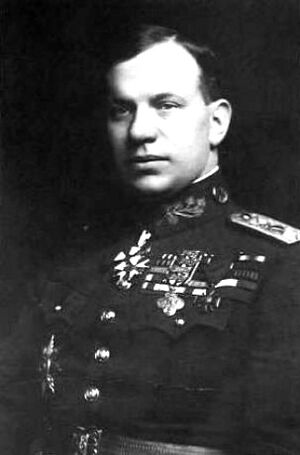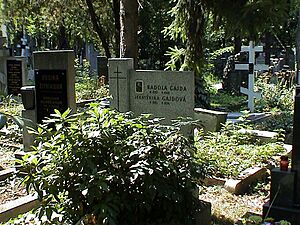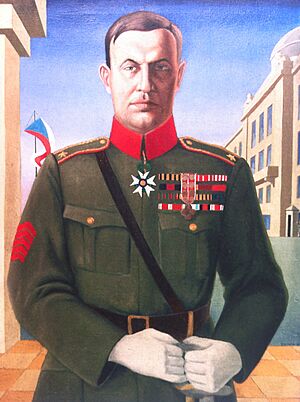Radola Gajda facts for kids
Quick facts for kids
Radola Gajda
|
|
|---|---|

Radola Gajda in 1933
|
|
| Born | 14 February 1892 Kotor, Kingdom of Dalmatia, Austria-Hungary |
| Died | 15 April 1948 (aged 56) Prague, Czechoslovakia |
| Allegiance | |
| Years of service | 1910–11; 1914–15 (Austro-Hungarian Army) 1915–1916 (Montenegrin Army) 1917–19; 1920–26 (Czechoslovak Army) 1919 (White Army) |
| Rank | Captain (Montenegro) Major General (Czechoslovakia) |
| Unit | Czechoslovak Legion |
| Commands held | Siberian Army |
| Battles/wars | World War I Russian Civil War |
Radola Gajda, born as Rudolf Geidl, was an important Czech military leader and politician. He was born on February 14, 1892, and passed away on April 15, 1948.
Contents
Early Life and Military Beginnings
Radola Gajda, originally named Rudolf Geidl, was born in Kotor. His father was an officer in the Austro-Hungarian Army. His mother was a Montenegrin noblewoman. Later, his family moved to Kyjov in Moravia. There, Rudolf went to a secondary school.
In 1910, he completed one year of required military service in Mostar. After this, he traveled to the Balkans. It is thought he took part in the Balkan Wars (1912–1913). When World War I began, he rejoined the Austro-Hungarian Army. He served in Dalmatia and Sarajevo. In September 1915, he was captured in Višegrad, Bosnia.
Joining the Legions
Right after being captured, Geidl changed sides. He became a captain in the Montenegrin Army. He had some experience with medicine and pretended to be a doctor. When the Montenegrin Army fell apart in 1916, Gajda escaped to Russia. He joined a Serbian group as a doctor.
In late 1916, this group was destroyed. Gajda then joined the Czechoslovak Legions on January 30, 1917. He started as a staff captain. Gajda showed he was a very skilled commander in the Battle of Zborov. He quickly moved up in the military ranks.
Fighting in the Russian Civil War
In May 1918, the Legion was moving along the Trans-Siberian railway. Fighting broke out between the Legion and the Bolsheviks. Czechoslovak soldiers quickly took control of large parts of the railway. This was east of the Volga River.
Gajda commanded the area from Novonikolayevsk (now Novosibirsk) north to Irkutsk. He used aggressive tactics, sometimes even against his superiors' orders. These actions helped defeat the Bolshevik forces. They also helped connect all the Legion's units. This led to disagreements with Tomáš Garrigue Masaryk. Masaryk wanted the Legions to stay neutral in the Russian Civil War.
After the Legion and the White Army captured Yekaterinburg in July 1918, Gajda set up his main office there. He used the Ipatiev House, where the Romanovs had been held captive.
One of his most successful operations was the capture of Perm on December 24, 1918. In this battle, the Legion took 20,000 prisoners. They also seized 5,000 railway cars, 60 cannons, 1,000 machine guns, and a fleet of ships. Gajda was very popular among his troops and the entire White movement. He was promoted to Major-General. People called him "the Siberian Ataman" and "the Siberian Tiger." Later, he accepted an offer from Aleksandr Kolchak to become a commander in his army.
His time with Kolchak was not as successful. The Red Army started to gain power. Kolchak's forces became weaker. Gajda fell out of Kolchak's favor and was dismissed on July 5, 1919. After being involved in a failed uprising against Kolchak on November 17, 1919, he escaped from Siberia. He then sailed to Europe.
Military Career in Czechoslovakia
When Gajda arrived in Czechoslovakia in early 1920, he received a pension and the rank of General. However, he was not given a command. In November 1920, he was sent to France to study military theory. He also studied agriculture.
Gajda returned two years later. On October 9, 1922, he was given command of the 11th Division in Košice, Slovakia. He became involved in the local culture, which made him popular. On December 1, 1924, he was named Deputy Chief of the General Staff in Prague. He worked under General Eugène Mittelhauser. Gajda became a rival to Mittelhauser. He successfully worked to reduce the influence of the French military mission, which ended in 1926. On March 20, 1926, he became the Acting Chief of the General Staff. In this role, he supported former legionnaires.
President Tomáš Garrigue Masaryk put pressure on Gajda to retire. This was because Gajda had shown support for Italian fascism. Along with political disagreements and concerns about a military takeover, this led to the ambitious general's dismissal.
Political Life
Still young at 34, Gajda decided to enter politics. In late 1926, he helped found the National Fascist Community (Czech: Národní obec fašistická, NOF). This party was based on Benito Mussolini's National Fascist Party. Gajda became its leader on January 2, 1927. In 1929, the party won several seats in parliament. In 1931, Gajda was briefly jailed and lost his military rank because of an earlier issue.
On the night of January 21–22, 1933, the Židenice Mutiny happened in Brno. This was an attempt by about 70 to 80 local fascists to overthrow the government. The uprising was quickly stopped. Gajda was arrested the next day. He was accused of encouraging the takeover. At first, he was found innocent. But after political pressure, the decision was changed. Gajda was sentenced to six months in prison. He also lost his military pension.

The NOF had some success in the 1935 elections. Gajda won a seat in parliament, which he held until 1939. At this time, the NOF was strongly against Germans. It supported building up the military and favored war with Nazi Germany over the Sudetenland. After the Munich Agreement, Gajda returned all his French and British honors as a sign of protest. In 1939, he was cleared of wrongdoing and given back his General rank. He also became active in the new Party of National Unity (Czech: Strana národní jednoty).
In March 1939, the political situation in Czechoslovakia was very unstable. Several attempts to take over the government were made. One of these hoped to make Gajda the new head of state. These attempts failed. A few days later, the remaining Czech lands were occupied by Nazi Germany.
Gajda was not a major public figure during the occupation. He stopped being involved in politics. He sometimes helped the Czech resistance. He helped army officers escape to Poland and hid his son's resistance activities. The Gestapo investigated him, but he avoided being imprisoned. When World War II ended, Gajda was imprisoned on May 12, 1945. He was treated harshly and almost lost his eyesight while in jail.
Later Years
In April 1947, he was put on trial for "spreading Fascism and Nazism." The prosecutor asked for a life sentence. Gajda's guilt was not clear. He was sentenced to two years, which allowed him to leave prison soon after. He had no money and was largely forgotten. He died several months later.
See also
- Gajda Affair
 | Chris Smalls |
 | Fred Hampton |
 | Ralph Abernathy |


